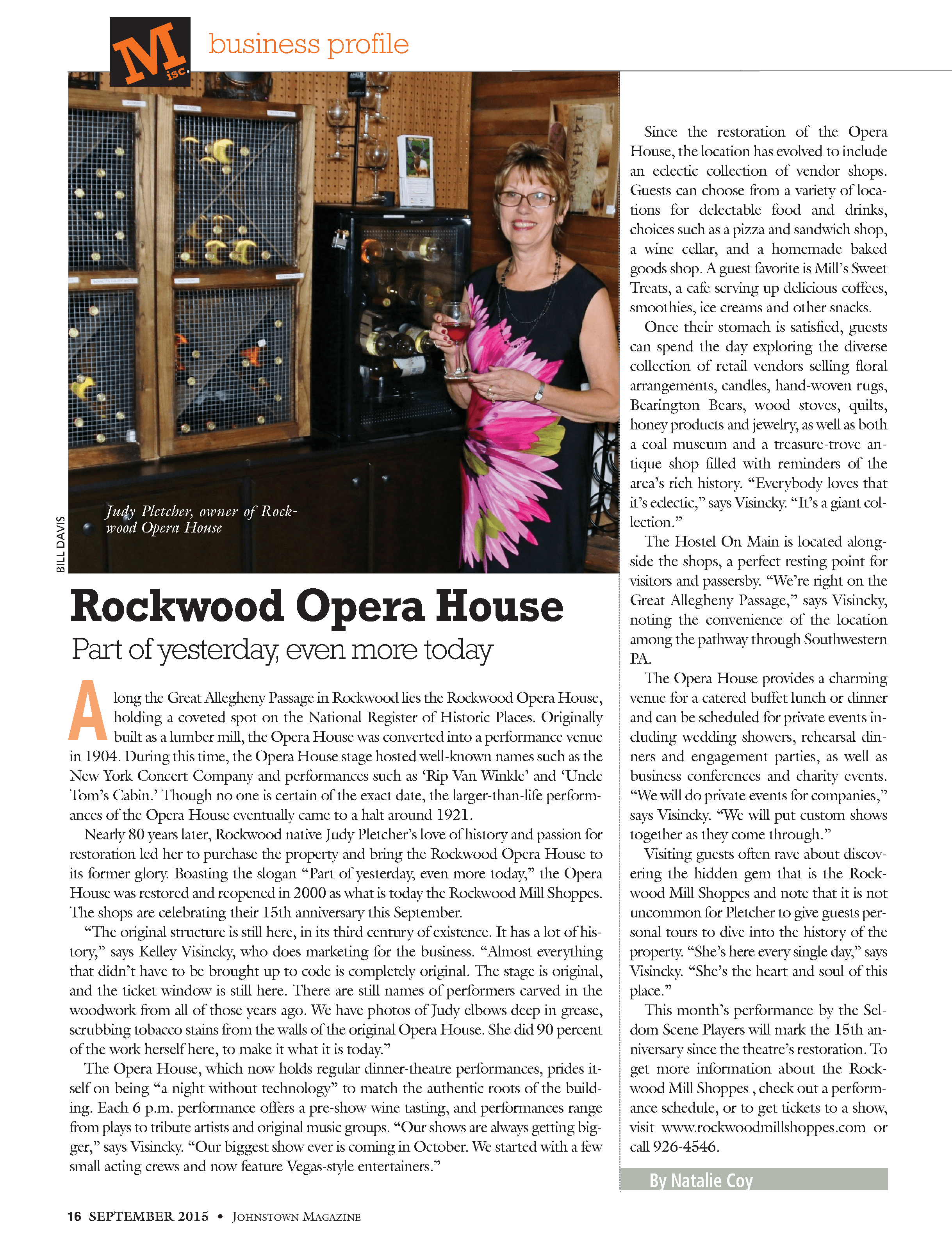Media & Awards
Media & Awards

A Rockwood Family is Turning a Former Feed Mill and Opera House into a Theater and Shoppes
Sunday, August 20, 2000
By Tom Gibb, Post-Gazette Staff Writer
ROCKWOOD, Pa. -- The theater in this southwest Somerset County burg once shared quarters with the feed mill, but the arrangement apparently didn't shrink the egos of show-biz people passing through.
Judy Pletcher and her husband, Terry, have restored the main performance room of an old opera house in Rockwood. Rockwood Mill Shoppes and Opera House staged its first dinner theater Friday night and plans another for October. The building will eventually also house restaurants and boutiques. (VWH Campbell, Post-Gazette)
They felt compelled to sign in, it seems. With flourish. On the walls.
In one coat room, in 1 1/2-inch-tall letters, somebody penciled, "The world's greatest picture show. San Francisco Fire, June 15-16, 1906." Around the corner, a handbill is plastered: "H.J. Meyer's Marvelous Moving Pictures and Specialties. Moral, instructional, pleasing. March 16, 1906."
And on dressing room wallpaper, somebody penned, "Masie Ward Minstrels, October 1904" along with the vow, "We will be back."
Nobody seems to know if, indeed, they ever came back. Nobody here is even sure who the Masie Ward Minstrels were. Small matter. Almost a century after it was jotted on the wall, the Minstrels' written promise seemed destined for oblivion, along with all the other inscriptions and the theater itself -- empty, slowly smothering in soot and dust.
This could be a story of another little gem in another little town, dying of neglect. Except that this story could end differently.
On Friday night, the newly christened Rockwood Mill Shoppes & Opera House staged a dinner theater. It was the first production in, well, maybe 94 years; nobody's really sure. Another show is in the works for October.
Food and craft shops and a bakery are up and running on the first floor. The long-abandoned theater -- or the opera house, as it once was called -- has been unsealed from its second-floor tomb, cleaned and polished. Borough council vice president Jack Benford proclaims the whole revival "the buzz of Rockwood."
And at the middle of it all is Judy Pletcher, accidental preservationist.
Pletcher, mother of two grown children and chief financial officer of her family's coal business, simply went looking for a place to open a conveniently located women's fitness center. She wound up buying a soot-laden feed mill with a past.
After $350,000, by her count, and a half-year of late nights by the family members she drafted, Pletcher has a live showpiece.
"I knew about the feed mill. But I've lived here all my life, and I'd never heard about the opera house," she said. "When I was told about that, well, it intrigued me. That's where things really got started."
This building in Rockwood was built more than a hundred years ago. It has served as an opera house and a grain mill, which was closed in the 1940s. Terry and Judy Pletcher purchased the building and are restoring it for performing artists, restaurants and boutiques. (VWH Campbell, Post-Gazette)
"What she's done is great for our community," said local historian Betty Arnold.
And great doesn't get to happen here a lot.
Rockwood, nine miles from Somerset, stretches out and lightly dozes along the Casselman River, as it flows southwest to the Youghiogheny. The downtown is three blocks long. On a summer evening, Main Street is good for little more than about a car every minute.
There is some bustle. In the middle of Main Street, Rockwood Casualty Insurance Co. has 80 people underwriting policies for five states. Down at one end of town, 120 people work at Rockwood Manufacturing, turning out door fixtures. The railroad tracks through Rockwood are one of CSX Corp.'s mainlines through Pennsylvania, daily carrying 40 or so freight trains and another four passenger trains.
"But it's mostly a quiet place," said Jeff Zerfoss, as he stopped on the wooden deck outside the Mill Shoppes and shared ice cream with son Dylan, 1. "Nice, quiet, kind of boring."
The feed mill belonged to a different time, when Rockwood had a few hundred more people, deep mines dotted the countryside, and the town had four brickyards and a brewery that bore a mild resemblance to a castle.
One of the people packing cash and power in the late-1800s Rockwood was local fixture Penrose Wolf, a businessman, major landholder and the man whose name is on the feed mill and its cast-iron safe.
The first half of the mill, a 2 1/2-story frame building, was built about 120 years ago. By the turn of the century, Wolf bought and added a hulking addition -- four floors of brick laid four layers thick, with three-story grain bins, a hefty freight elevator and a back door just about belly-up to the railroad tracks.
According to his stationery, he dealt in lumber, grain, hardware, groceries and, in a touch of incongruity, theater.
It was standard for small towns of the day to have their own theaters. There were no 77 cable channels or "The Jerry Springer Show." So towns set up their own auditoriums to get on the circuit for touring theater troupes, lecturers and moving picture shows.
Wolf's was just over his offices. It was 55 by 30 feet, with a 3-foot-high stage. But sometime -- the new owners can only guess when -- the shows stopped, and the opera house was sealed off from the rest of the building.
From 1942 until 1992, renter Ray Friedline ran the feed mill.
Then, nothing.
Judy Pletcher didn't come looking for this building. She simply sent her daughter-in-law out, scouting spots where they could set up her fitness center.
"She came home and said, 'I found us a building,' " Pletcher said. "I thought, 'A feed store? That's intriguing.' "
Or appalling, depending on your reservoir of optimism.
"There was lots and lots of dirt -- 100 years of dirt from being close to the railroad, with all the steam engines passing by," Pletcher said.
On one stretch of yet-to-be-finished second floor, she briefly stopped an impromptu tour, pawed the blackened floorboards with her toe and said, "We thought this was paint."
It was grime. And there were almost three 6,000-square-foot floors of it. In the opera house, paint and plaster hung like stalactites. An inch of dirt covered the floor.
"I said, 'The feed mill? What the heck are you talking about?' " husband Terry Pletcher said. "I could see the possibility for a lot more work than she did."
But neither could see the full scope of the job. The Pletchers are working to get the building on the National Register of Historic Places. That can get you tax breaks. It also can get you a 12-cylinder headache.
The state Department of Labor and Industry mandated such newfangled additions as smoke detectors, fire doors and lifts for the handicapped. All that, though, had to coexist with the old. The Register's rules say you can't make substantial changes to anything of historic importance. You can't add anything that's out of character for the building. You can't just paint over dirt or discoloration. And where you do paint, you have to pick from the Register's list of approved colors.
The chestnut paneling was cleaned up with boiled linseed oil. At last count, the floor cleanup had consumed 120 gallons of a degreaser called Crud Cutter.
And it all took time.
Professionals did the exterior, painting it a cream yellow, terra cotta and dark green.
The Pletchers did the interior.
On this night, it was a little after 9 o'clock, and Terry Pletcher was in the stone-and-concrete cellar of the mill, painting a fire door in a work space set up amid a forest of foot-square oak beams holding up the ceiling above.
"I get done at my job," said Pletcher, a supervisor at the family coal company, Action Mining Inc. "Then, you work here till 10 or 11 at night, six days a week."
His wife comes in at 6 a.m. to help fire up the bakery, goes off to her day job, then returns about 5:30 in the afternoon to work into the night.
"It's a lot of fun," she said, "and less stressful than my current job."
Downstairs, spread between the old front office and storefront facades are a family-owned ice cream parlor, coffee shop and bakery -- selections the Pletchers made after mailing out 1,730 questionnaires, one to every postal customer in the local ZIP code, and getting 570 returns.
They added a locally owned pizza shop and 11 vendors dealing in crafts and flowers. Other tenants, such as a bicycle and kayak rental shop, could sign on, Judy Pletcher said.
But the showpiece is upstairs, the opera house, now done up in wallpaper and cleaned-up chestnut paneling, the jottings of its turn-of-the-century show people still preserved behind glass. On this day, its tables were set for 120 people for Friday's $20-a-head dinner theater, an offering by the Seldom Seen Players of nearby Addison.
It will take events such as this and tenant merchants' rents to keep the Rockwood Mill Shoppes & Opera House alive, Judy Pletcher said. "Selling coffee and doughnuts isn't going to pay for it all."
And the Pletchers are looking beyond Rockwood for their trade. Seven Springs Mountain Resort is nine miles away. The Scotty Land campgrounds aren't far down the road.
The Allegheny Highland Trail, a bicycle trail following the Casselman through Rockwood and stretching 26 miles across southern Somerset County, is drawing 7,000 cyclists a year in good weather, local caretaker Maynard Sembower said.
By next year, it should be tied into the link rolling on to McKeesport. In three years, it should be a section in a path stretching from Pittsburgh to Washington, D.C.
"The number of people on the trail will just go up then," Sembower said.
In the meantime, Judy Pletcher hasn't given up on her plans for a fitness center.
"We haven't done it yet," she said. "But that will come."
Find Us
Contact Us
450 Main Street, Rockwood PA
rockwoodmill@verizon.net
814-926-4546
Hours of Operation
CLOSED
Share
Tweet
Share
Mail
Copy: Rockwood Mill Shoppes 2015



